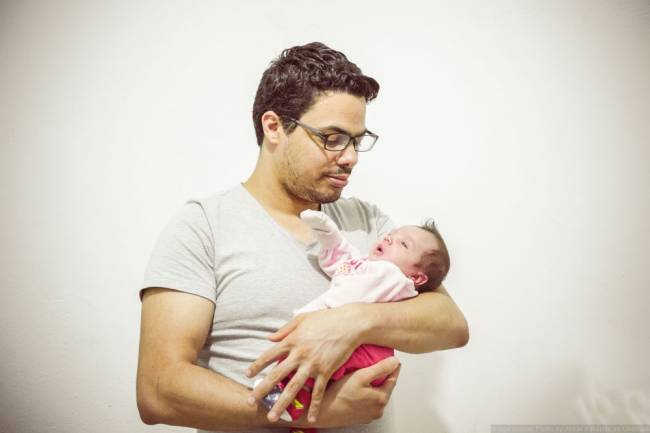So, your partner has had the positive pregnancy test, you’ve possibly even had a scan or two. Think there is not much you can do until the baby gets here? That you are not a dad yet? Actually, this is one of the biggest myths of all. The truth is that you can make both labour and the early days with your newborn easier by being fully involved during the pregnancy

Often dads refer to becoming a father on the day that their child is born. My own discussions and surveys with men show that this is a common feeling. On an emotional/psychological level, us blokes tend to be anything up to a full 9 months behind our partners, not really fully bonding with our babies or seeing ourselves as fathers until the birth.
This is understandable really – mums go through so many physical and emotional changes throughout pregnancy, whereas, for us men, things often pretty much stay the same. This means that to be involved we need to make more of an effort. I refer to this process as ‘antenatal bonding’. If your partner is pregnant and you are not feeling connected to your baby yet, don’t panic, but do make the conscious decision to bond with your baby before he or she is born. Antenatal bonding for most of us men is not a natural process; it takes a conscious decision and effort to do it, but it has massive impact.
Bonding With Your Baby
We affect our baby’s development from the moment they are conceived. That’s right, dads, your attitude and support throughout pregnancy, can directly affect how your baby grows and develops in the uterus. An awesome thought isn’t it? Dr David Chamberlain, a renowned psychologist who has researched prenatal development, psychology and bonding, refers to the time Baby spends in the womb as, ‘an intense learning period in one’s life and time to establish patterns for a lifetime.’
That sounds pretty mind-blowing, but how does that happen?
Well, your unborn baby has an ear by just three weeks (so probably before you even know you are expecting!). Their ear is functional by 16 weeks, and at 24 weeks they can hear sounds from outside. Some psychologists point to evidence of babies in the uterus being able to kick in time to music at 25 weeks! This means for most of the pregnancy, your baby can hear your voice. They will know who you are, and already be bonding with you.
This learning is also the building blocks for what happens postnatally. Once Baby is born, when you talk to them, they will recognise and respond to your voice from the times they heard it during pregnancy. Therefore, obviously the more they have heard you during pregnancy, once they are here your voice will be more familiar to them. This is brilliant in terms of being able to calm them when they arrive… you can almost see it as putting in time now with your baby to allow them to get to know you, will make it easier for you to calm and soothe them when they are here in your arms.
Why Does it Matter?
There is not one single reason why bonding with your unborn baby is important, in fact there are several pretty crucial ones, including:
- For your baby’s development… Helping create a calm & positive environment is integral to the physiological development of your unborn baby. Any stress which Mum might feel during pregnancy increases the production of stress hormones which can easily cross the placenta to the unborn baby. In moderation, these are beneficial to Baby’s neurological development, but in excess can have an adverse effect. So your role in creating a calm, stable, home environment is important, from the time of pregnancy.
- For your baby’s wellbeing… In order to ensure the healthiest outcome for your baby it is important to know them from the start. You may think your task is done now you’ve created the baby, but your job doesn’t end there!
- For your own confidence… Antenatal bonding is also important for your own confidence. You will find that the more connected to feel to your baby during pregnancy, the more you will be comfortable and at ease with your newborn when they arrive. Your baby will also sense this inner-confidence, and feel more secure and safe with you too as a result, which again will help keep them feeling calm and bonded with you when they have arrived.
- For your relationship… For you as a couple, life will feel more harmonious if you are putting in the time, effort and interest. Showing an interest in your baby and the pregnancy, will help you be closer to your partner, as she will feel that you value both her and the baby. Sometimes the pregnancy and postnatal days can be tough on relationships, so this is really important for keeping a strong foundation. For those of you who have chosen to breastfeed, evidence shows that involved dads leads to more successful breastfeeding, and breastfeeding is known for its positive health benefits for both Mum and Baby.
- For your own wellbeing… It is finally becoming accepted that fathers too can suffer from postnatal depression (PND), and antenatal bonding can also help reduce the chances of PND. A common cause for PND in men is that they feel guilt when they don’t instantly feel bonded with their baby. To compound this further, men can end up feeling excluded and isolated in their own family – because they are not bonded they retreat, becoming less and less involved with the baby, thus making their bonding issue worse. These are feelings where being proactive is a really positive way to prevention. Some men are fortunate to feel an instant bond at birth, but for many that bond establishes over time. It is harder for that bond to establish in among all the additional pressures of becoming a family, so why leave it until the birth to start bonding with your child, when you can start during the pregnancy?
Dads Say:
‘The pregnancy just didn’t seem that real to me. Obviously I knew she was growing our baby in there, but I didn’t feel particularly connected to the baby. I was just waiting until it was born as I didn’t think that I could bond with our baby until then. When I learnt about the benefits of bonding during pregnancy I thought it was something I should give a go, I felt a bit stupid just talking or reading to the bump (it’s just not me) but I play guitar, so I started to play my music for baby, which felt a lot more natural. It did help and when our son arrived, he would happily listen to me play, so I think he remembered it!’ – David
Ok, it’s important… so how do I do it?
There are some very simple things you can do to bond with your baby. I’ve provided a list of suggestions here. You don’t need them all, just choose to do those you feel comfortable with, but make the decision to do something.
- If you have pictures from a scan, keep them to hand and look at them more often than just the one time at the scan! This will help you start to visualise your baby. As men we find it hard to attach to things we can’t see, hear or touch. This will help you start to think of your baby as a real person and start the bonding process.
- Try greeting ‘the bump’ or your baby as well as your partner after coming home from work, etc. You don’t have to be over the top, a quick ‘Hello, Baby’ and a gentle pat on bump is all it needs, your baby will be able to hear and feel you!
- Give your baby a name – this will make them more of a real person. It doesn’t have to be the name they will have when born, it can just be a nickname.
- Spend time together as a family. Talk, sing or play music to your baby, or maybe recite a rhyme or read a short story. Ideally pick one thing, and repeat it each time. Your unborn baby will start to recognise a song/rhyme/story if they hear it repeatedly. We often hear of mums telling us that their babies recognise particular CDs or TV show theme songs when they are born that they heard a lot during pregnancy! What is really great about this is not that your baby will not just recognise the story/song/etc. but they will also connect it to a time of feeling loved and content, and so, once born, singing this song or reading the same story is a great calming method.
- At around 20–24 weeks you will be able to feel your baby move or kick. This is a great opportunity to become physically connected and bonded to Baby. Take time to feel their movements, and as the pregnancy progresses, some babies love playing hide-and-seek with Dad!
- Start a blog. Daddy blogs are becoming popular. You can record details about the scans or appointments, how you are both feeling, milestones, etc. This will all help reinforce the fact your baby is another person in the family already, and they are great to look back on as Baby gets older.
Get involved – check your baby’s movements
A baby’s movements are an excellent indicator of its wellbeing and a great bonding opportunity. As your baby develops, their number and type of movements will change with their activity pattern. Your baby will have sleep periods that will usually last between 20 and 40 minutes and rarely last longer than 90 minutes, something you could practice in preparation for the newborn days! The number of movements tends to increase until 32 weeks of pregnancy and then stay about the same although the type of movement may change as due date approaches. It is important to remember that babies should not stop moving towards the end and will continue to move right up until labour and often during birth.
While your partner may complain that her ribs are imitating a punch bag and her bladder is being used as a football, this is a great sign that your baby is well. You may however find yourself on the receiving end of a sharp tongue if you choose this moment to point this out! There are however constructive ways you can help and be involved.
If your partner has had a busy day they may not have noticed the baby move. Having a time when you can sit down together and feel the baby is a great way to monitor movement and bond with your baby. You can also orchestrate opportunities for her to feel the baby move herself. Run her a bath, bring her some chocolate, a cold drink or generally give her the chance to put her feet up and feel the baby kick, flutter, swish and roll!
If your partner ever feels uneasy about the pattern of movement or has any bad feelings encourage her to follow her instincts and contact her midwife or hospital. Mums know best! Never ignore a change of movements or allow her to go to sleep following a spell of reduced or erratic movements. Always encourage her to call her midwife or go to the hospital to be checked.
So to sum up…
There you go, no more ‘there is nothing I can do to bond with my baby until they are here’ or ‘I’m not a dad yet’. You ARE now a dad, and there are lots of things you can be doing, and there are huge benefits for you, your partner and your baby in doing them.
It is worth the effort, so ask yourself, what are you going to do today to bond with your baby?








